Golf Bedlam
Latest > The Foozler Goes Caddying
Jul 6th, 2016
The Foozler Goes Caddying
He hates golf, we make him play
Words: Ben Marshall Photography: Neil Thomson
They might look like a bunch of ne’erdowells, but these golfing pirates of the Royal & Ancient (i.e. caddies) are the heart and soul of golf. The Foozler investigates...
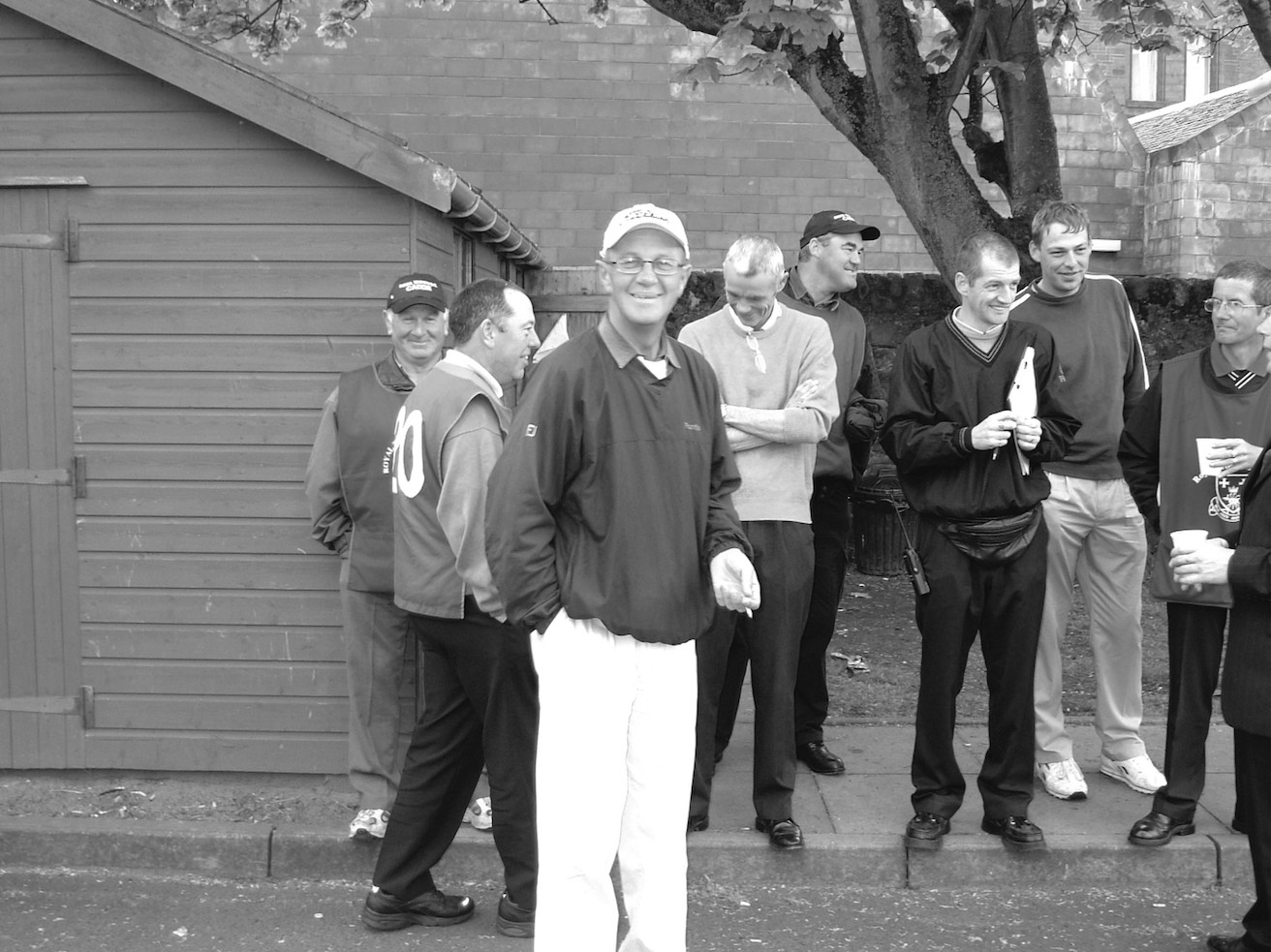
Wattie & the boys brace themselves for the Canadians...
Golf lends itself to cinema and the written word in a way most sports, with the arguable exception of boxing, could not possibly hope to do. Authors as diverse as John Updike and PG Wodehouse have devoted thousands of words to the game. Hemingway had bull fighting; Mailer, boxing. Updike and Wodehouse have golf.
Hard-bastard modernist directors like Martin Scorcese have featured golf to reveal something profound about their characters. Think Casino and GoodFellas. On the flip side the Farrelly Brothers and Adam Sandler have employed the game to reveal the profoundly ridiculous.
A favourite figure in all these reams of print and miles of film is The Caddy. Broadly speaking there are two ways literature and cinema deal with this strange companion. Two schools. The first celebrates the virtues of the profession, treating the caddy less like a servant and more like a gentleman’s gentleman. In this version he is a sort of Jeeves of the fairways, a man so helpful he will only break his respectful silence to offer some winning pearl of wisdom. The second school portrays golf ’s wonder-boys as either astonishingly inept or wildly conniving.
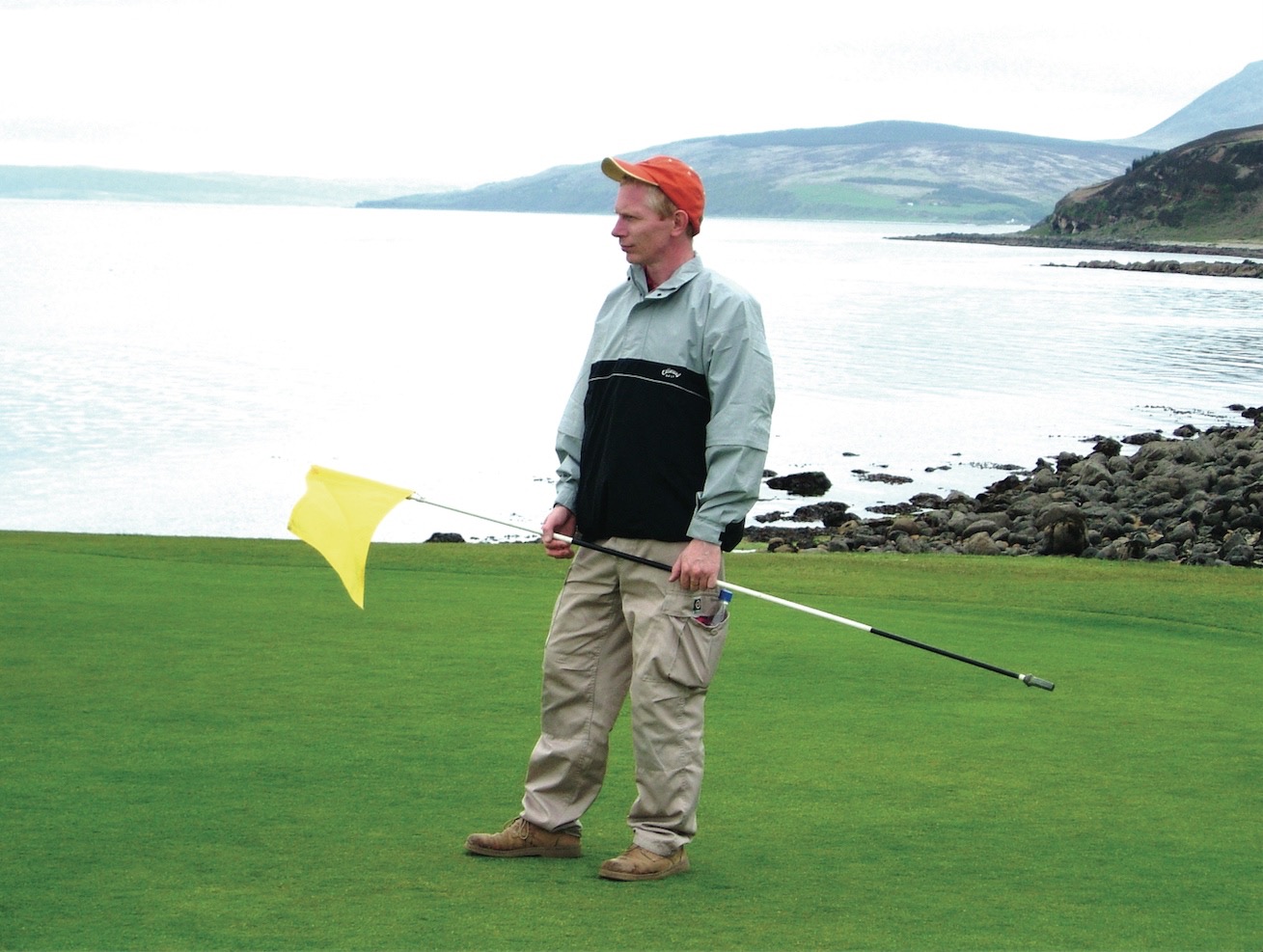
The Foozler: Invented by P.G.Wodehouse – ruined by GolfPunk
None of the literature, however, can quite prepare you for the reality I encountered in Scotland. On the Isle of Arran I caddied. In the pubs of Troon I met with the caddies. I caddied badly but I got drunk rather well, though not quite as well as the caddies themselves who appear, upon occasion, to take their beer a whole lot more seriously than they take their golf.
The Isle of Arran astonished beyond all expectations. Shiskine is a 12-hole links course that snakes its way along beaches and over cliffs tops. It is an astonishing piece of land – breathtakingly, dramatically beautiful, and I speak as someone who normally cannot bear anything to do with the countryside. I also speak as someone who enjoyed these views bent double as I lugged around a golf bag.
There were four of us, Tim Southwell, GolfPunk’s Editor, John Niven author of the brilliant Kill Your Friends, who Tim was playing against, and the photographer Neil Thomson. Oh, and me, whose job it became to get in the way.
The day we arrived the skies were a faded denim blue, the sea translucent Mediterranean azure and the preternaturally green grass was scattered with golden flowers. Truly Shiskine looks unreal. Like some place designed by one of those Hollywood art directors who thinks that Scotland doesn’t look Scottish enough so goes off and knocks up his own idealised version.
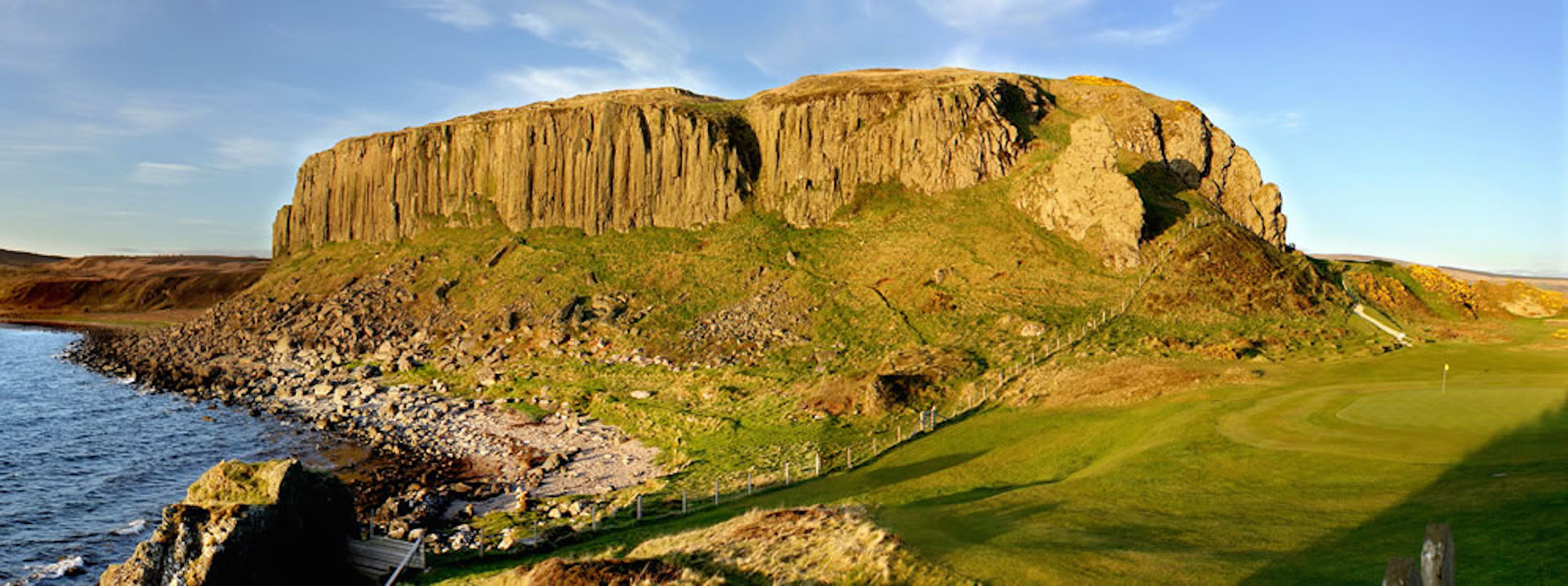 Shiskine: Nothing to write home about.
Shiskine: Nothing to write home about.
That’s Shiskine, it doesn’t just lend itself to cinema, it is cinema. I prepared myself to be the worst caddy in the history of this whole weird game.
Which is not to say I did not have my uses. As a Himalayan pack mule I have a very promising career ahead of me. I am also pretty good at moaning and I positively excelled myself at admiring the views when I should have been following the golfers around. I also had one truly inspirational moment. Actually it was entirely inadvertent, but boy did it work.
As John dropped into a state of almost Zen-like calm to take a horribly tricky putt I remembered I was thirsty. Reaching into the golf bag I retrieved a bottle of Irn Bru and began very carefully to unscrew the cap.
I reasoned that this was best done in stages as John seemed to need to concentrate quite hard. “Hiss” went the bottle. John glanced sideways looking puzzled for a second. I waited deferentially until he had regained his composure and then gave the cap another, slightly more commanding twist. “Hisssss” pronounced the bottle contentedly. Once again John looked up.
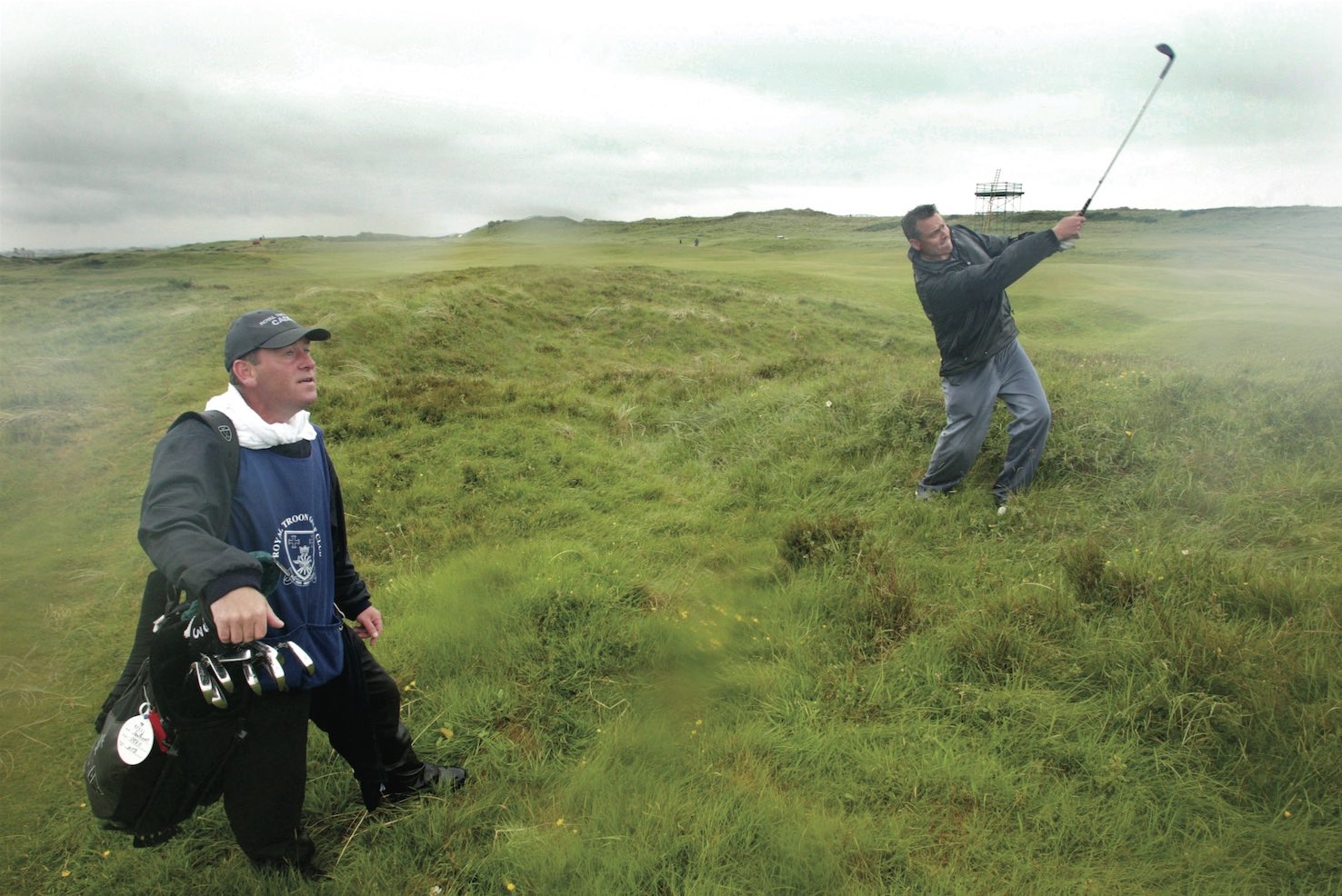 "You've got some shit on the end of your club.... no, not that end!"
"You've got some shit on the end of your club.... no, not that end!"
I sensed an uncharacteristic frustration in his bearing and wondered perhaps if he was pondering matters at home, some problem he felt unable to discuss. I felt it best not to bring up the matter now as there was a certain amount of pride resting in this game. Once again John settled back into a state of single-minded concentration.
I gave the bottle a final turn. “Hissssssssss” it sighed appreciatively. Standing on that green grass, under that blue sky, out in the Irish Sea, listening to the noises my bottle of fizzy pop was making, I wondered: “Is that what leprechauns sound like when they fart?” It’s just a shame I had to wonder out- loud.
John missed his shot. Boy did he miss his shot. John comprehensively fucked up. John is a decent and highly cultivated man and I suspect that these are qualities which prevented him from kicking my head in. Tim of course was delighted. It was Tim I was caddying for.
There and then I learnt something about the black art of caddying. It is not simply a matter of helping your golfer out, it is about hurting his opponent. Only a caddy can do this because golfing etiquette demands that you are never visibly, audibly critical of your opponent. “Superb!” you will shout as they tee off and knock the ball onto the green with their second on a par five. And your fulsome exclamation will, no doubt, sound like a fair facsimile of sincerity. Equally, when things go horribly wrong for one or other of you, condolences are offered up in the grave and profiteering manner of a funeral director at a coach crash.
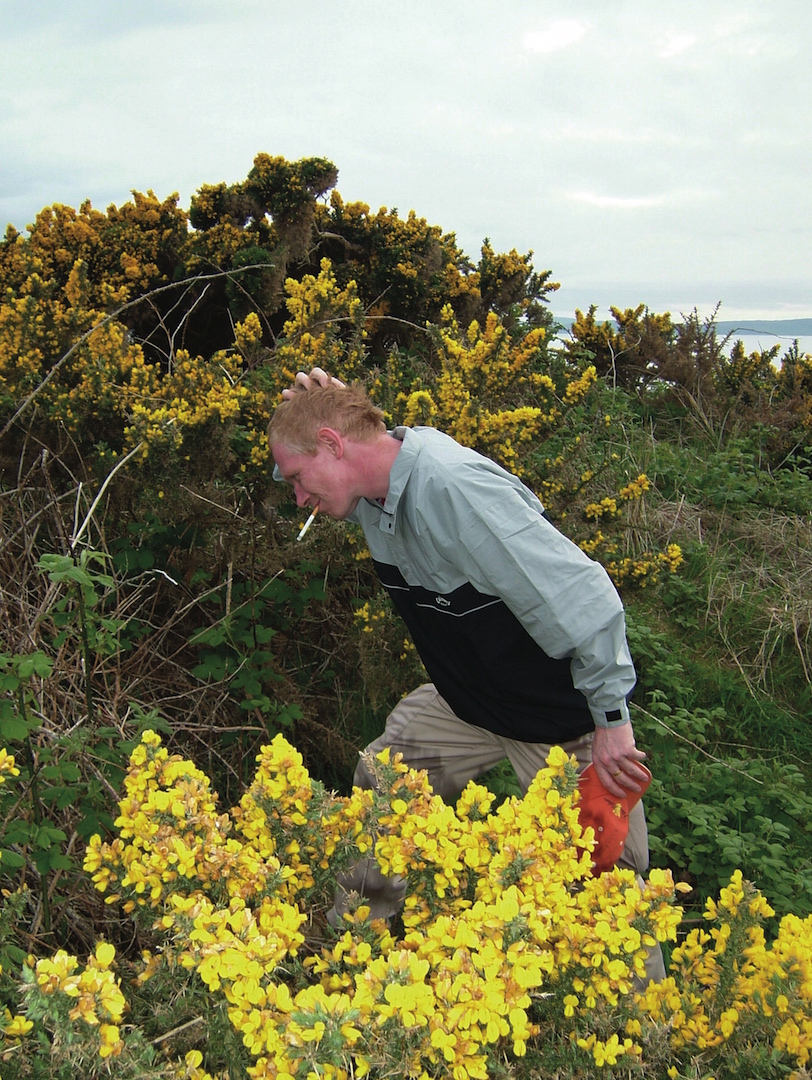 I'm sure I hid the whisky in this hedge
I'm sure I hid the whisky in this hedge
Golf, to paraphrase John Updike, appeals to the child and the idiot in us. (Just how childlike golf players become is proven by their frequent inability to count past five.) Children take exuberant and explicit delight in the defeat of an opponent. Golfers do much the same thing but they express it in a politely worded inversion. Good is bad. Bad is good. I guess that’s why the game appeals to Puff Daddy and the Sicilian Mafia. Never say what you mean, kill with a kiss and all that.
Caddies on the other hand can say what they are thinking. They can also say what you are thinking. And in extreme circumstances they may even say what your rival is thinking. This perhaps has much to do with the little acknowledged fact that Caddies are, more often than not, far, far better golfers than you could ever hope to be.
Sporting historians seem largely to agree that caddying is actually as old as the game of itself. Since some sporting historians believe that golf originated in The Netherlands in the 11th century (the Dutch word kolf means club), and others still point to the Romans (who had a game played with a bent stick and a ball made of feathers) as the original source of the game, we can safely assume that caddying is a profession almost as old as the oldest profession.
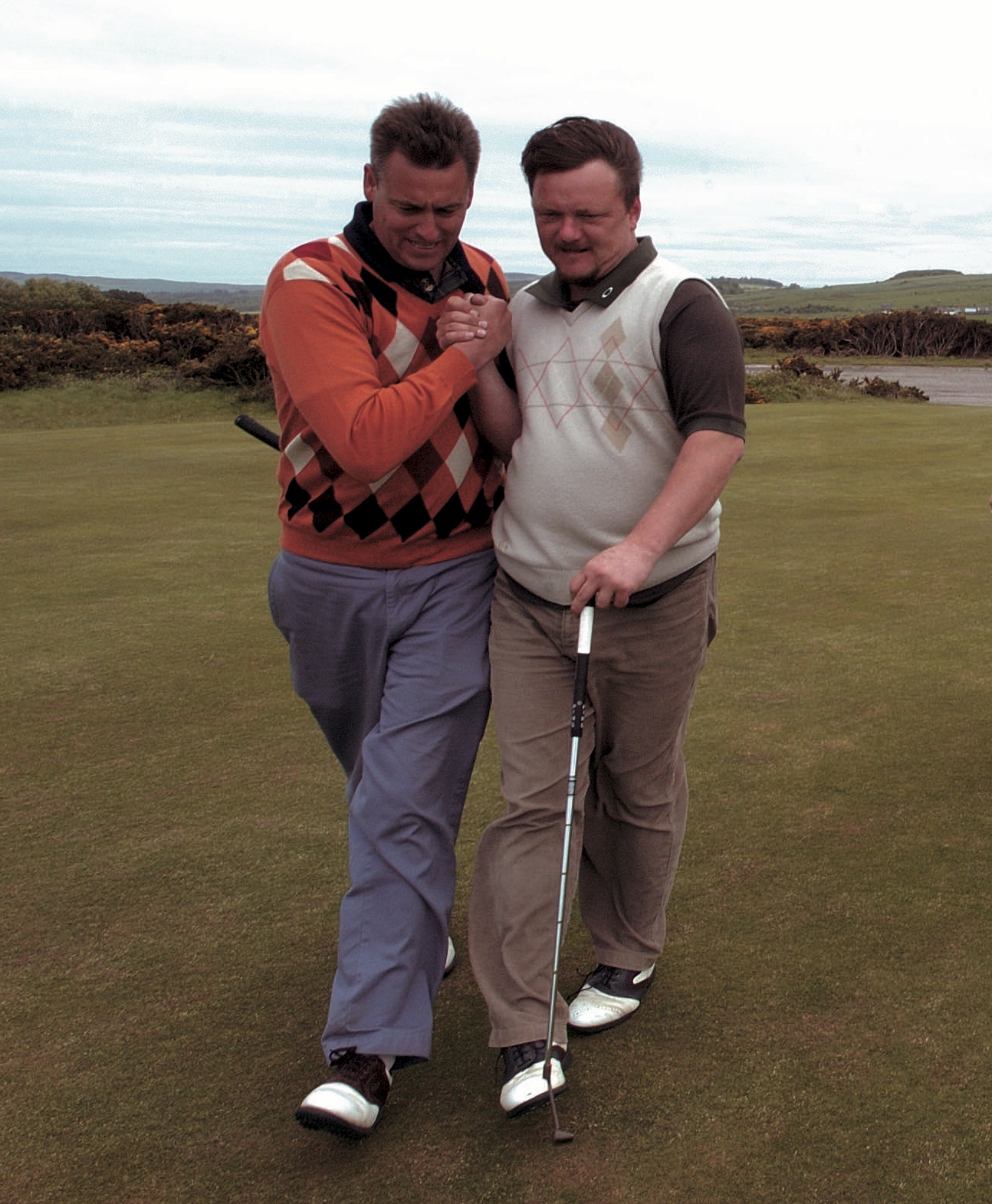
Southwell & Niven: No love lost clearly
As men and boys have always been used to carry equipment in games, there is no reason to believe that golf and its Roman and Dutch antecedents were exceptional. What has been fairly well established is that the game as it is known today was actually devised by the Scots in the 14th or 15th century.
The game became so popular in Scotland that in order to keep people from playing golf when they should have been practicing archery, a military necessity at the time as the Scots were fighting just about everyone, the Scottish parliament passed a special law banning the sport in 1457. The Scottish people, however, largely ignored this and similar laws, and early in the 16th century James IV, king of Scotland, took up the game of golf.
However it was his granddaughter Mary, later Mary Queen of Scots, who made the caddy integral to the game. Playing the game in France, where she was raised, the young men who attended her on the golf links were known as cadets (pupils); the term was adopted later in Scotland and England and became caddie or caddy.
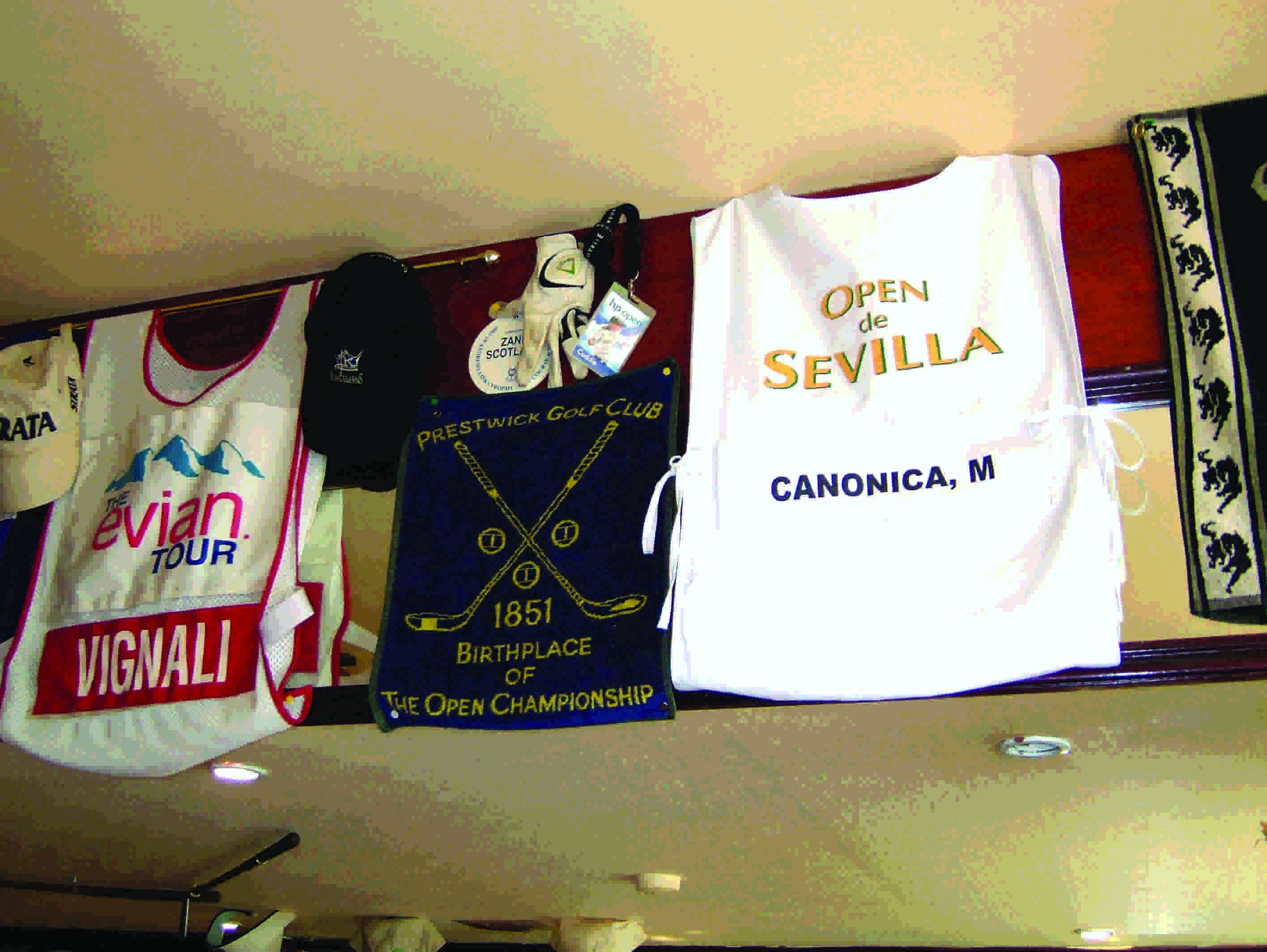
Evian – the caddie's best friend
Arguably the man who turned the caddy from slave into Spartacus was Harry Vardon. Born in Jersey in 1870 Vardon caddied for all manner of snooty aristocrats. By 1890 however he had become a professional golfer. He went on to win six British Open championships in 1896, 1898, 1899, 1903, 1911 and 1914. Since then many caddies have followed in Vardon’s footsteps (see box out below).
On the whole, though, caddies have remained poorly paid and often badly treated. Never more was this the case than in America in the 1920s. At the time two caddies were employed. One to carry equipment and advise on shots and distances and the other to repel the wasps and flies that so often invaded America’s warmer courses.
Repel is actually the wrong word. The second caddie was known as a Jam Boy because he was made to cover himself in jam or maple syrup and attract the insects away from the golfer. Leaving aside altogether the fact that there might not have been so many insects on the course had there also not been so many half-naked young men covered in jam wandering around it, this is a special sort of humiliation. It is small wonder then that caddies developed a dark humour about the men and women who employed them.
 This was an area that Jimmy advised Tim to seriously consider visiting after another woeful foozle...
This was an area that Jimmy advised Tim to seriously consider visiting after another woeful foozle...
Here for instance are a few pearls dropped from the sky as we toured the pubs and golf courses of Troon:
Fat Canadian to Caddy: “How’d ya like my game?”
Caddy: “Not bad sir, but I prefer golf.”
Different Fat Canadian: “I have never, ever played this badly before”
Caddy: “I had no idea you had played before.”
Third Fat Canadian: “Could you please stop checking your watch, it’s really distracting.”
Caddy: “It’s not a watch sir, it’s a fucking compass”
Caddies, of course, can be great. They can really help your game.You only need to look at the way the pros rely upon them. Conversely they can also act as your malign sporting conscience. It’s been said by countless people before, but golf is the great leveller.
Most of those who can afford to play the game are probably doing rather well in life. The judge judges. The CEO is surrounded by obsequiously careerist yes-men. The immaculately-dressed fashionista is used to be being told how good he looks.
Criticism is a very, very distant memory. Self-criticism is an anathema. On a golf course, however, you are forced to see yourself as you are. The cars, the money, the job, all that ceases to matter. You live in the moment. You are who you are. And in case you ever forget you can always hire a caddy to remind you.
Caddies are thick on the ground in Troon. John, Tim and I spent several hours trawling disreputable boozers asking men with broken noses who we should ask for. “Wattie and Jimmy,” they replied to a man. We finally meet Wattie and Jimmy in the Caddy Shack. The Caddy Shack for God’s sake? I am not sure why that didn’t occur to us. Maybe for the same reason that you wouldn’t go looking for authentic Cockneys in a pub called the Pearly Queen.
Wattie was present if not quite correct. He’d had a few and was keen to have a few more. Still Wattie is an affable looking guy with kind, intelligent eyes and he was immediately obliging. A bit of background. He started playing golf at the age of five. In his teens he was touring.
“When you live in Troon and you wanna make some money, you roll up to the nearest golf course and wait to be called. It’s not quite like that now but . . .” He fades away momentarily. “I was better at golf when I was 12 than I am now.”
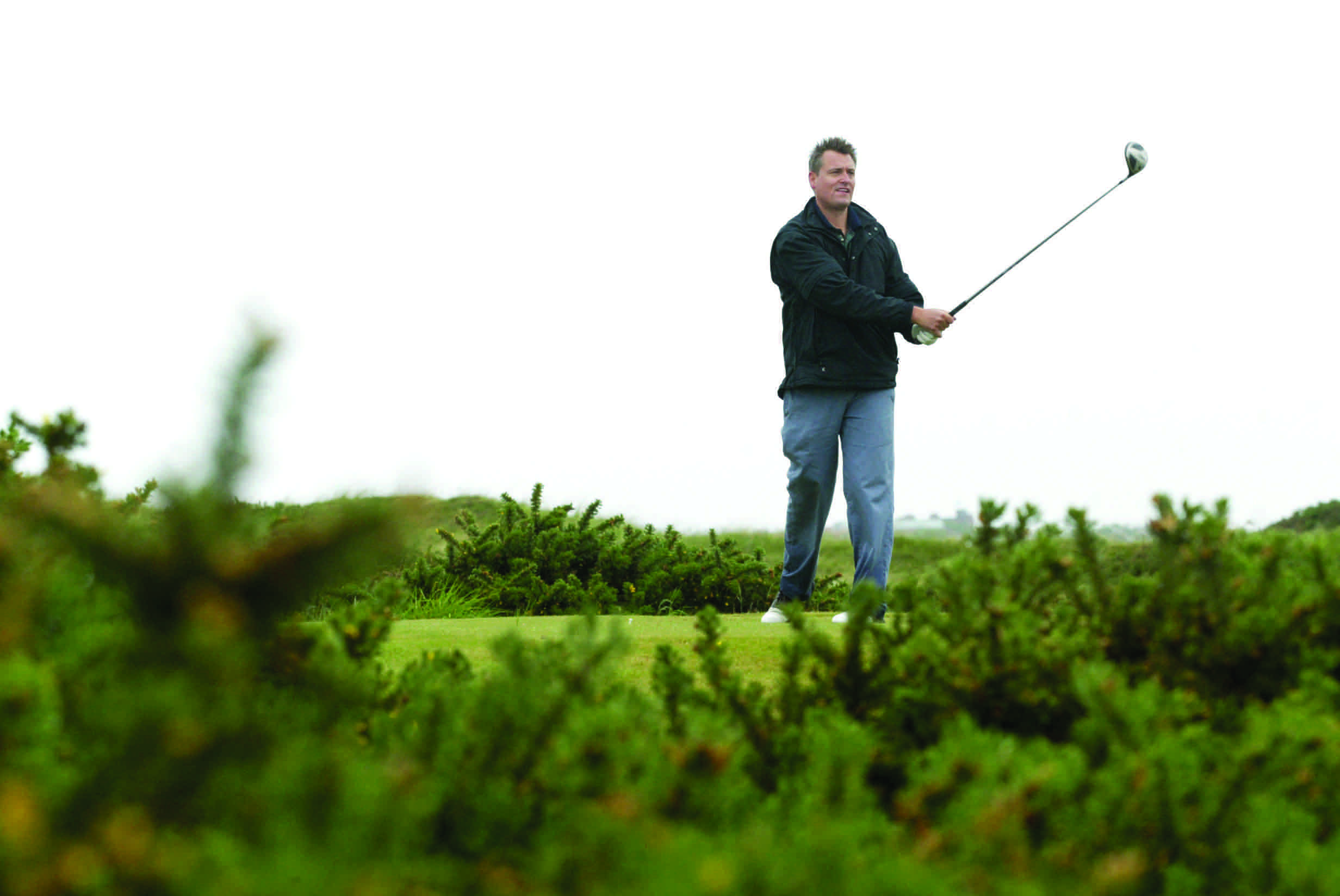 Don't look all pensive like it went where you intended...
Don't look all pensive like it went where you intended...
Wattie could, he claims, with a bit more practice and a bit less booze, have been a “very, very, very good player”. I suspect that this particular truth applies to an awful lot of caddies. Wattie loved golf from the age of five and he has never stopped loving it. He is one of those strange looking people of indeterminate age. You know he is over 40 but beyond that it’s a lottery.
Now he works in a bar and he caddies. Jimmy, a handsome former fireman who owns his own printing business, is a tough looking bastard with a good line in anecdotes and a few truly snappy put downs. Here, for instance, is a good example. I was told, when ordering drinks, to ask for no specific lager but instead demand Wattie and Jimmy’s drinks. The drinks looked much like lager to me, but God knows. At one point, when ordering drinks, a huge guy at the bar, a fellow caddy, asked me to hand Jimmy a drink that was not his own.
“Go on,” he said, “It’ll be a laugh. Just tell me what he says...” So I did exactly that. “That is not my drink,” said Jimmy firmly. “Yeah, I know,” I replied. “Your mate just wondered what you would say.”
“C U Next Thursday,” said Jimmy.
A few rounds later the big guy at the bar, now several single malts worse for wear, asked me what Jimmy had said. When I told him, I almost caused a riot. You know immediately, from talking to Wattie and Jimmy, why caddies have to be so hard. To begin with they have to deal with other caddies. Our conversation naturally revolved around the extremely bloody obvious. How much are caddies paid. Badly as it turns out, and very bloody badly in this part of the world.
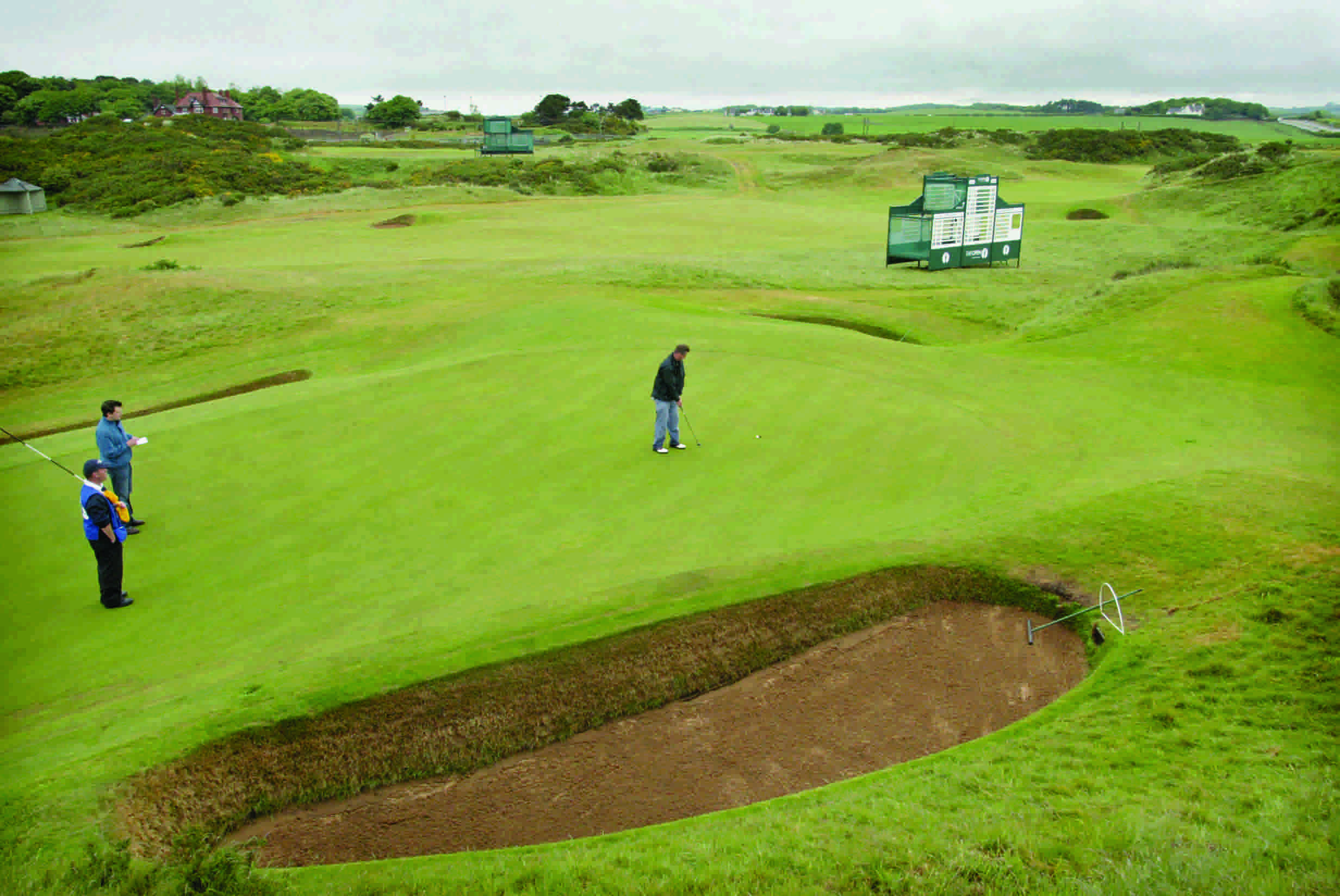
The Postage Stamp: He actually managed a par here
Who are the best tippers? Well the second worst are the English and the very worst are the Canadians. “We call ’em canoes,” says Wattie mysteriously. “Cos a canoe never fucking tips.” The best, as you might expect, are the Americans. Both Jimmy and Wattie have Americans they once caddied for who, good tippers and good blokes, are now good mates. When these good American mates turn up in Scotland they divide their time between the courses of Argyle and the pubs of Troon. Caddying, they both intone darkly, has changed in the last 15 years.
“Now the Caddy Master is everything, there’s no room for fun,” says Wattie. There is a sense here that caddying has gone the way of every other industry. It was a struggle between the Roundheads and the Cavaliers and the Roundheads have definitively won. Journalists blame their own situation on Rupert Murdoch, Caddies blame theirs on the Caddy Master. However, there is still room for fun. Often when Jimmy and Wattie are caddying they will spot one another across the distant fairways.
“Jimmy will see me,” says Wattie. “He’ll say fuck all, but he’ll turn to the fellah he’s with and bet him he can make me take my hat off ”
“It’s normally a fiver or a tenner bet,” adds John.
“And sure as fuck I’ll remove my hat and some Canadian is down a tenner. Or vice versa, you know...”
And all this from a quarter of a mile away. Nice work. Sadly it does bring us to the somewhat awkward question of how much caddies cheat. It is common knowledge that caddies, poorly paid and better skilled than most amateur golfers, will sometimes bet on the progress of rival golfers and, very occasionally, give lousy advice in order to ensure a pay-out
That’s the rumour, that’s what they say. Wattie and Jimmy deny they have ever given bad advice or indeed bet upon anything more harmful than that hat stunt. Turf accountants excepted of course. Frankly, I believe them. Despite the fact that I offered to get their drinks all evening they insisted upon getting their round in. And for that and a whole lot of other reasons I liked them. A lot.
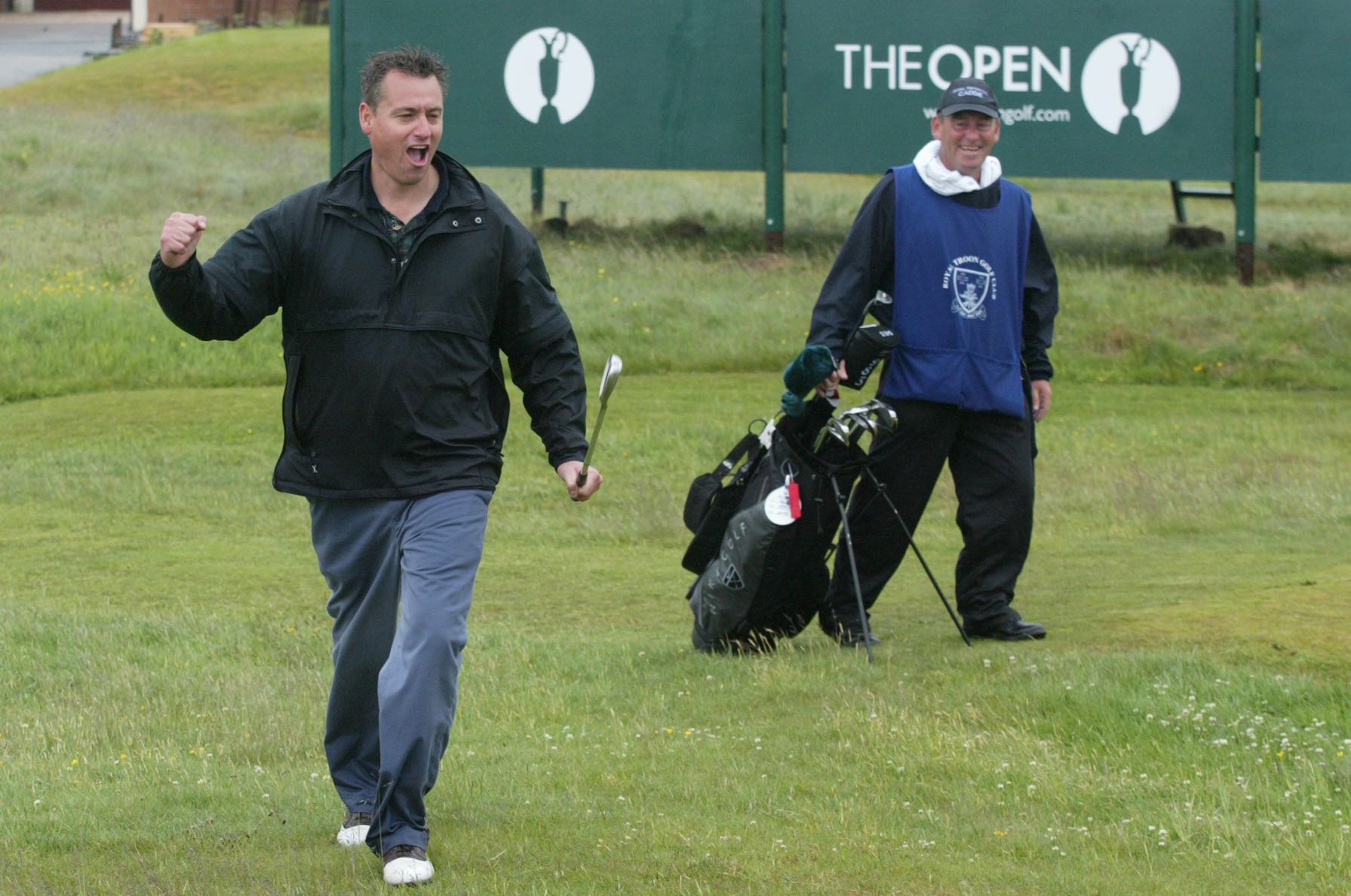 Eat my double bogey!
Eat my double bogey!
The problem, admittedly not an earth-shattering one, is that this is exactly the same mantra I heard from every other caddy I spoke to. “Cheat? Not me mate, no.” In these indignant protestations I was reminded of a time I spent in Wormwood Scrubs interviewing prisoners about their crimes. All of them claimed to be innocent while simultaneously bemoaning the fact that they were forced to share a building with a gang of liars, thieves and murderers. That was all of them. Surely, I thought, someone must, at the very least, be a liar.
The following day Neil and I travelled to Troon’s real Caddy Shack. Not the pub, but the shack. We were welcomed immediately, given cups of hot coffee and had the warm piss taken out of us. The Shack, though, was justashack. Thesortofclumsywoodenstructurefilmdirector’sphotograph crumbling into the Louisiana bayou. Except this was in Scotland at one of the world’s most famous golf courses. The caddies have been promised somewhere new for years. And every year some gruesome prick in a pin- stripe suit lies to them.
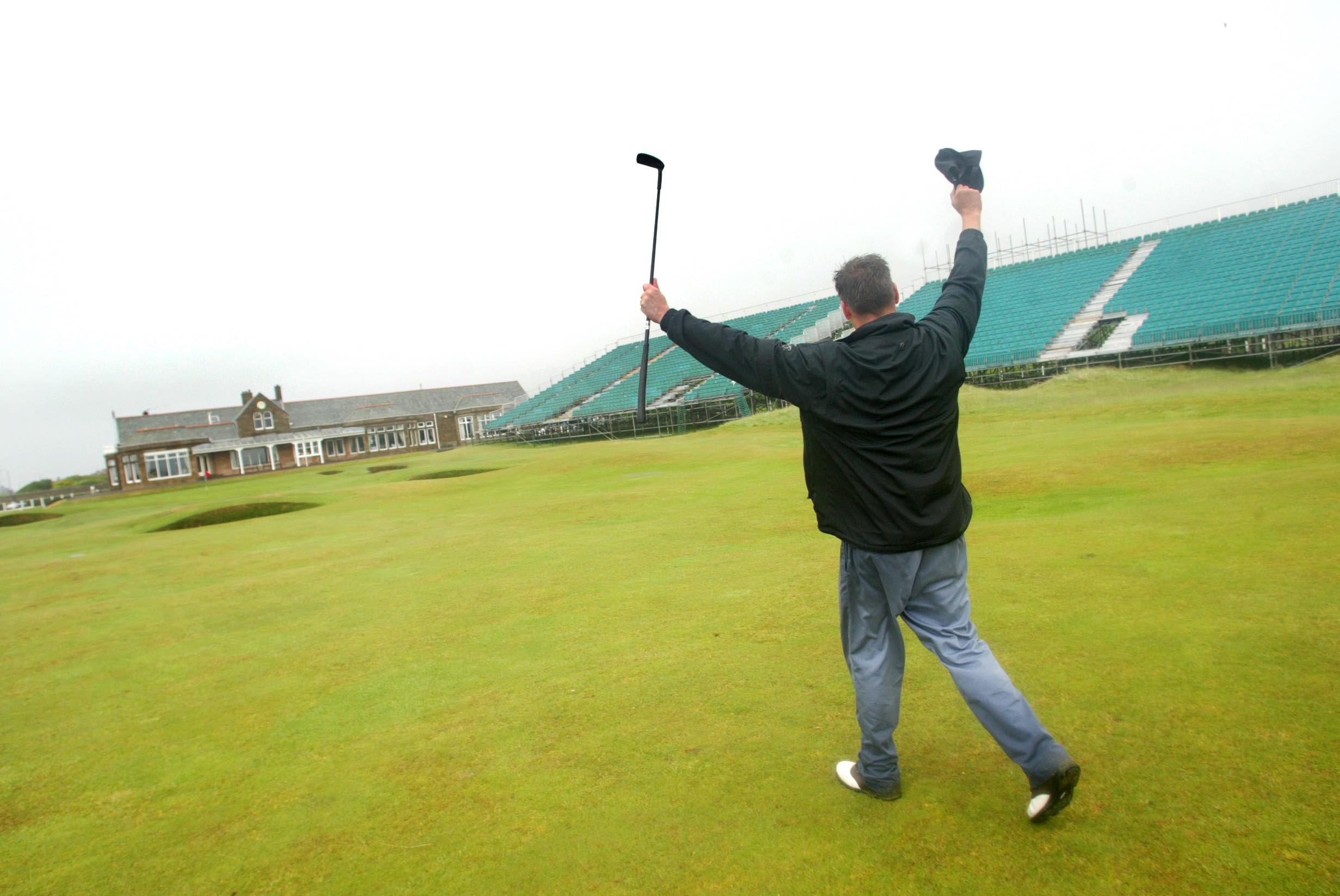 Two pars, five bogeys, five triples and six unmentionables: Take a bow, son
Two pars, five bogeys, five triples and six unmentionables: Take a bow, son
So why in the name of heaven do the caddies do it? Why do they caddy? The caddy – often cheated upon but always ready with a practical joke – is that rarest of thing an ice-cold cynic with a genuine lust for life. Quite simply, they must just love the game. Really, really love it. I like that idea. That is certainly the idea I got from Wattie and Jimmy.
It makes sense. Even now, as I write, my mind is transported back to the impossible beauties of the Isle of Arran and Shiskine’s 12-hole course. It was the first golf competition I have ever watched live and close up. I was, for sure, awed by the majesty of the views and, frankly, buggered by the golf bag. Nevertheless I was still able to appreciate just how beautifully, subtly competitive this game can be.
My friends, Tim and John, were eloquent in their shots and cordial in their recriminations. The pleasures and frustrations of this bewildering game began to dawn upon me. And, let’s face it neither of them are that great. That’s what they tell me. But in this setting I could feel Golf’s mysterious and dramatizing pull. No wonder caddies do what they do. No wonder they put up with the crap they take and give it back in gritty, Celtic spade-fulls. No wonder they mock and bet and fuck around. It makes up for the derisory money. It makes up for that fucking shack. It makes you see the skies blue.
This sport, I am beginning to see, elevates the soul.
Rake rat’s progress
Famous caddies who went massive as players
HARRY VARDON
Harry Vardon was born in Jersey in 1870. He began playing golf at the age of five and spent much of his youth caddying. At 20 he became a professional golfer and went on to win six British Open championships. (1896, 1898, 1899, 1903, 1914). Vardon died in 1939 as a relatively rich man.
GENE SARAZEN
Sarazen was born in 1902 in Harrisson, New York. The son of a desperately poor Italian immigrant carpenter he entered golf as a caddy at Rye, New York. He was in his early teens. In 1922 – at the age of 20 – Sarazen won the US Open championship. He won it again in 1932, when he also won the British Open. He has been the subject of numerous biographies and has been the recipient of Awards from the Professional Golfers Association.
BYRON NELSON.
This American golfer was born in 1912 in Fort Worth, Texas. He began golf as a caddy and in 1933 embarked upon his professional career. Nelson won the US National Open title in 1939 and the Professional Golfers Association Championship in 1940 and again in 1945.
BEN HOGAN
Born in 1912 in Dublin, Texas, Hogan, a former caddie, began his professional career in 1937. One of the game’s great money winners he won the Professional Golfers Association Championship in 1946 and 1948. Even a serious car accident did not stop him from playing and betting.
LEE TREVINO
Born in 1939, Trevino, started caddying in Texas, aged eight. After eighth grade, he was forced to caddy full-time for $30 a week in order to survive. But he was a player waiting to happen. In 1967 he turned pro, winning on 29 tournaments including five majors and made a bloody fortune.
